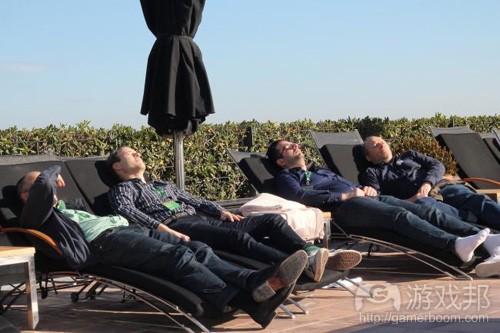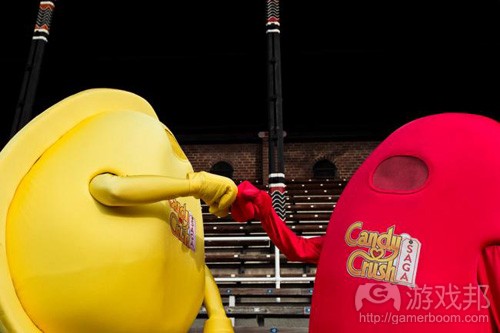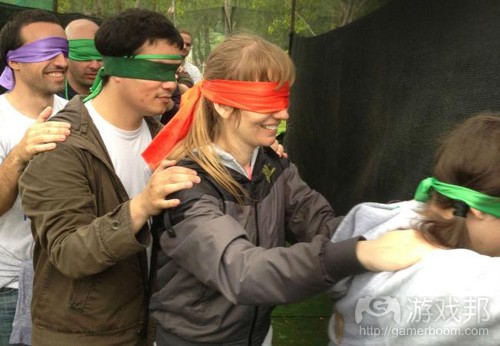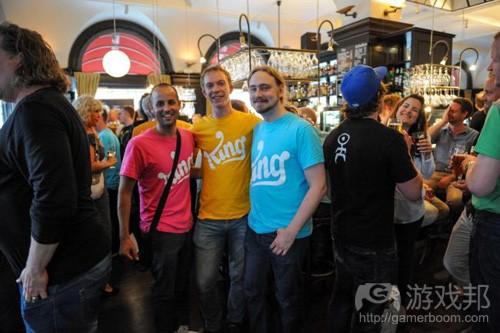阐述King公司“快乐工作”的运营理念
作者:Jim Squires
与其他知名媒体的同行一起,我有幸参观了位于斯德哥尔摩的King工作室。这家休闲游戏巨头的代表作是《Candy Crush Saga》和《Farm Heroes Saga》。
此行我们详细地了解了他们如何成为领先的跨平台开发者,尽管这些事迹和数字令人震撼,给我们留下最深刻印象的却是:King的员工很快乐。不是“因为有媒体在这里,所以大家要摆出笑脸”的那种快乐,而是发自内心的那种快乐。目睹了他们的日常运作情况后,不难看出为什么。
下午5点下班。与游戏行业的许多公司一样,组成King团队的成员具有各种各样的背景。成员名单有很多是做过某AAA游戏的人的名字。比如,《Pet Rescue Saga》的首席制作人Henrik Sebring在进入King的Malmo工作室以前是在育碧参与制作即将推出的游戏《The Division》。如果你曾经做过AAA游戏,你一定经历过那种令人崩溃的时期——每一款游戏在发布前都要经历的“关键时刻”。
当你从事AAA/零售游戏,你必须时时追赶可怕的截止日期。为此,你可能要每周在办公室工作120个小时,直到力竭不支。这就是糟糕的现实,也是King不得不担忧的问题。因为从事社交/手机游戏开发,King可以设置自己的截止日期。产品不到发布就不算完工,如果润饰还不够就把发布期延后。因此,King的员工总是能按时下班陪家人。
团队合作不竞争。当一家公司内有好几支团队在做多个项目时,往往形成竞争性环境。团队A希望自己的游戏卖得比团队B的好,团队B也不甘心输比团队A。这并不是适合好好做游戏的环境。虽然King的团队承认希望看到自己的产品成为公司的“《Candy Crush》第二”,但King的整个结构是围绕“合作和分享”建立起来的。
怎么做?虽然King旗下有多个工作室且每个工作室都有自己的项目,但King努力把所有工作室都聚集在欧洲。这么做有两非常明智的理由:一是工作室都处于相同的时区,二是工作室之间可以通过快速航班往返。假设你在伦敦的工作室做《Farm Heroes Saga》,你可能有一个创意想添加到游戏中,但你不知道如何执行。因为这是一款三连消游戏,你打电话给身在斯德哥尔摩的首席制作人,看看他们有没有试过。接着你接到通知这款游戏的几位开发者来伦敦跟你一起工作几天,和你的团队一起完善想法,看看是否可行。
King的合作文化不是把你自己的游戏做好——而是把King的游戏做好。那意味着所有人其实都在一个大团队中,无论你属于哪一个工作室,在做哪一款游戏。
宽容失败。做游戏是一个要么成功要么失败的命题。有些游戏会成功,有些游戏会失败。King接受这个事实。他们在斯德哥尔摩有一个团队就是专门负责为新游戏构思创意的。或者准确地说,King有一支专业的空想家团队。
当他们想到一个想尝试的点子时,他们就会做成网页游戏放在King.com上。网站是他们的“竞技场”,也是新想法的测试基地。
如果游戏在King.com上表现良好,他们就知道这款游戏的成功只是时间问题,多亏了神奇的分析学。我不想废话太多细节,但King有一个公式可以推导某款游戏是否能够成为下一个“Saga”,是否值得重制为Facebook游戏和手机游戏。极少游戏能达到这个程度——没关系。尝试和失败是我们的学习途径;对于像King这样的游戏公司也不例外,因为这就是生活。
每个工作室不超过80人。还记得上中学时你怎么知道你的年级的所有学生的名字吧吗?虽然King正在以过快的速度成长着,但他们保证把每个工作室的人数控制在人人都能记住其他人的名字的范围内。我们都听说工作室人数不应该超过70或80。为什么?我想答案还是得回到之前提到的合作文化。如果你知道所有人的名字和他们分别干什么,你就不会老是说“喂,那谁,过来看看我设计的新关卡。”
玛芬蛋糕。我没有问过他们每天的“福利”是什么,但根据上图,应该可以猜到是美味的玛芬蛋糕。蛋糕的白色部分是白巧克力/奶酪蛋糕,馅料是巧克力酱。这种蛋糕太粘了,我只好用纸把它包成像墨西哥煎玉米卷的样子。
早上9点来工作室,我看到有几个人聚在一起,一边吃美味的早餐,一边开小会。确实,正是这样的氛围使King成为King。King不是那种让你急匆匆地闯进来扑到办公桌上的公司。在King,你与周围的人建立良好的关系。你合作,你倾听,你享受美味的早餐。也许,只是也许,你还会在这个过程中想出个把令人惊艳的休闲游戏。(本文为游戏邦/gamerboom.com编译,拒绝任何不保留版权的转载,如需转载请联系:游戏邦)
5 reasons you want to work at King
By Jim Squires
Along with a handful of other notable press outlets, Gamezebo was recently given the opportunity to tour the Stockholm studios of King, the casual games giant behind titles like Candy Crush Saga and Farm Heroes Saga.
We learned a lot about the business of being a leading cross-platform developer, yet despite all of the facts and figures thrown our way, one learning stood out above everything else: King’s employees are happy. Not just “there’s press here, plaster on a fake smile” happy, but really, genuinely happy. After seeing how the day-to-day operates, it’s not hard to see why.
You’ll be home by 5pm. Like many employees in the games industry, the teams that make up King have a diverse background. It’s not uncommon to come across names and faces that had previously worked on AAA games production. Henrik Sebring, the lead producer on Pet Rescue Saga, was working on Ubisoft’s upcoming The Division before heading up King’s Malmo studio. And if you’ve ever worked in AAA games, there’s a dreaded period that every title seems to go through right before release – “crunch time.”
When you work in the AAA/retail space, there are hard deadlines that need to be met. This can result in 120-hour weeks with people living at the office, only stopping to collapse from exhaustion.
It’s a terrible reality, and it’s one that King doesn’t have to worry about. By working in the social/mobile space, King can set their own deadlines. Products are never final at launch, and if something isn’t quite polished enough, they can always move dates around. Because of this, you’ll always be home in time to enjoy quality time with your family.
Teams don’t compete, they collaborate. When a company has multiple teams working on multiple projects, all too often they see it as a competitive environment. Team A wants their game to sell better than Team B, and vice versa. It’s not an environment that’s conducive to making your game the best it can be. And while the different teams at King admittedly want to see their product become the next Candy Crush for the company, King’s entire structure is designed around collaboration and sharing.
How so? While King operates a number of studios, each focused on their own games, they’ve made an effort to keep all of those studios in Europe. There are two very smart reasons for this: everyone will be working in the same time zone, and no studio is more than a quick flight away. Let’s say you’re working on Farm Heroes Saga in King’s London office. You might have an idea that you’d like to add into the game, but you’re not sure how it will perform. Since it’s a match-3 game, you pick up the phone and call the lead producer on Candy Crush Saga in Stockholm to see if they’ve ever tried it. The next thing you know some Candy Crush folks have just landed at Heathrow to spend a few days with you, fine-tuning the idea with your team to see if it can work.
The corporate culture isn’t about your game doing well – it’s about King doing well. That means everyone is on the same team, regardless of the studio and game you’re tied to.
Failure is totally an option. Making games is a hit or miss proposition in the most literal sense possible. Some games will be hits, more games will be misses. King both gets and embraces this fact. They have a team in Stockholm whose entire job is to dream up ideas for new games. Let that sink in for a minute – King has professional daydreamers. When they hit on a formula that they want to try, they make a web-based game for King.com – their “tournament” site that doubles as a testing ground for new ideas.
If a game performs well on King.com, they’ll know its future in a matter of days thanks to the magic of analytics. I won’t bore you with the details, but there’s a formula that will tell King whether or not a game should graduate to “Saga” status and get a deep-and-detailed remake for Facebook and mobile. Very few games get to this point – and that’s ok. Trying and failing is how we learn; this is a fact that’s as applicable to a games company like King as it is in our own lives.
Studios don’t have more than 80 people. Remember being in elementary school, how you knew all of the names of the kids in your grade, and the grades above and below you? Welcome to King. While the company is growing at a breakneck pace, they’re committed to keeping individual studios small enough that everybody knows everybody else. We were told that no studio should have more than 70 or 80 people. Why? I suppose this loops right back to the earlier mentioned positive: the culture of collaboration. If you know who everyone is and what everyone does, there are fewer roadblocks to saying “hey Lars, come take a look at this new level I’m designing.”
This muffin. I didn’t ask them about what their day-to-day catering is like, but if this muffin is any indication, it’s insanely good. The white part was kind of a white chocolate/cheesecake thing, and the inside was like a chocolate soup. It was so gooey that I eventually had to use the paper sleeve to squish it into a taco.
Walking through the studio at 9am, I saw more than a few folks gathered around a pretty great breakfast spread, taking a quick meeting as they enjoyed some communal food time together. And really, it’s this vibe that sums up what King is all about. This doesn’t seem to be the sort of studio where you rush in and tie yourself to your desk. It’s about good working relationships with the people around you. You collaborate; you listen. You enjoy a good breakfast. And maybe, just maybe, you make some amazing casual games in the process.(source:gamezebo)
上一篇:写给游戏行业新人的入门告诫
下一篇:采用响应式设计应注意的三个层面












































 闽公网安备35020302001549号
闽公网安备35020302001549号